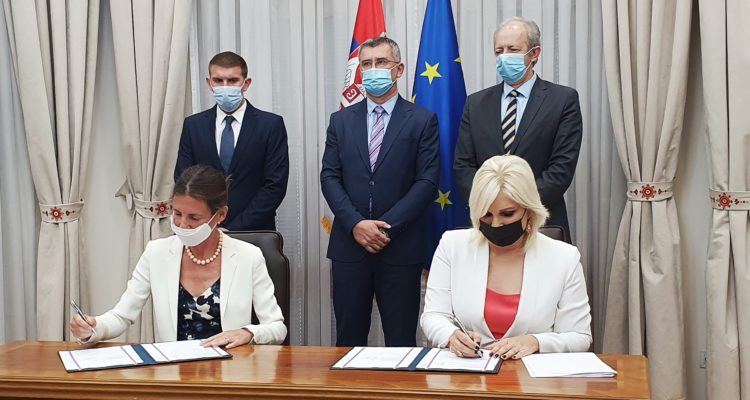Belgrade, July 2, 2021 – The Ministry of Mining and Energy of Serbia and the United Nations Development Program (UNDP) signed an agreement today to provide technical assistance for an energy efficiency project for central government buildings, which is to provide for the renovation of 28 buildings, including the headquarters of the Government of Serbia, The National Assembly of Serbia and the Palace of Serbia.
The agreement was signed by the Minister of Mining and Energy of Serbia, Zorana Mihajlović, and the Resident Representative of the UNDP in Serbia, Francine Pickup.
The Minister of Mining and Energy, Zorana Mihajlović, said that half of the buildings to become energy efficient were under the offices of the state, and that these were mostly old and consumed a lot of energy.
She specified that the technical documentation of the project should be completed by March or April next year, while the corresponding renovations should start in the second half of 2022.
„The project means that energy consumption will be reduced by 30 percent overall, while the emission of harmful gases, primarily CO2, by about 20 percent,“ stated Mihajlović.
She asserted that the goal of the Government of Serbia is that every decision and project that is contracted must have a positive effect towards protecting the environment and must enable the reduction of CO2 emissions and other harmful substances into the atmosphere.
„Energy efficiency is a way to ensure a safer environment, and the state’s goal is to reduce energy consumption for heating by at least 20 to 30 percent in the next few years, as today Serbia consumes 40 percent more energy for heating than do EU countries,“ said Mihajlovic.
The UNDP Resident Representative in Serbia, Francine Pickup, said that the project is important not only for the state, but also for its citizens, as energy savings reduce dependence on imports and enhance national energy security, while at the same time reducing adverse impacts on the environment. In addition, she stated that this makes the Serbian economy more competitive on the world market.
„In the Western Balkans region, 36 percent of all CO2 emissions come from public and private buildings. Buildings are also the largest consumers of energy, but when designed or adapted for more efficient energy consumption, buildings represent a great potential for energy savings,“ Pickup said.
She added that as part of the project, the Ministry of Mining and Energy and the UNDP had conducted a study on energy savings in public buildings of the central government, which served as the basis for loans being approved from the Council of Europe Development Bank.
„The expected reduction in primary energy consumption in these buildings could be 260 million kWh, which is equal, for example, to the amount of electricity that the City of Novi Sad consumes for public lighting over ten years. It has been shown that the energy-efficiency renovations of these 28 buildings could reduce CO2 emissions by 58,000 tons over 10 years – this, for comparison, is the same as burning 320 coal wagons,“ said Pickup.
With this project, the Ministry of Mining and Energy envisages the preparation of energy certificates and detailed energy inspections of buildings, as well as feasibility studies and project documentation for the energy renovation of the buildings in Belgrade, comprising a total area of 208,000 square meters, half of which falls under state administration.
As stated by the Minister of Mining and Energy of Serbia, Zorana Mihajlović, this documentation will serve, among other things, to establish the current condition of buildings when it comes to energy consumption and to assess where potential savings could be greatest for each of the buildings, i.e. how exactly the buildings should be upgraded to maximize energy efficiency.
The next step, as Mihajlović indicated, would be the realization of the energy renovation of the buildings, for which the Government of Serbia and the Ministry of Mining and Energy agreed on a loan of 40 million euros from the Council of Europe Development Bank, approved by the CEB Board of Directors in November 2019. The loan was signed by the Minister of Finance of Serbia in March 2020 and ratified by the Assembly of Serbia in November 2020.
As Mihajlović specified, the energy renovation would include the building of the Government of Serbia, i.e., the former Palace of the Ministry of Finance and the Kingdom of Yugoslavia, the Palace of the President of the Republic, the Palace of Serbia, the economic headquarters of the Government of Serbia (SIV 3), the National Assembly of Serbia, the Republic Property Directorate for European Integration, the Republic Commission for the Protection of Rights in Public Procurement Procedures, the Anti-Corruption Agency, and the Club of People’s Deputies, as well as a number of buildings belonging to specific ministries.
The renovation of the building of the High Judicial Council and the State Prosecutors’ Council is also planned, as is the Palace of the Main Post Office in Belgrade, which houses the Commissioner for Information of Public Importance and Personal Data Protection, the Constitutional Court, the Institute for the Protection of Nature of Serbia, and the Institute for Education and Development.
Other buildings for which energy renovations are planned include the Intellectual Property Office, the Republic Agency for the Peaceful Settlement of Labor Disputes, the Directorate for Measures and Precious Metals, the Agricultural Land Administration, the Office of the National Council for Coordination of Cooperation with Russia and China, and the Agency for Environmental Protection.
Additionally, there are the Republic Directorate for Commodity Reserves, the Directorate for Electronic Administration, the Administrative Inspectorate, the building of the Ministry and Judicial Bodies, the building of the Commissioner for the Protection of Equality, and the Payments Administration.
It is envisaged that the Energy Efficiency Program of the Central Government Buildings will be implemented by the Ministry of Mining and Energy and the UNDP, in cooperation with the Directorate for Joint Affairs of the Republican Bodies, over a five-year period.
